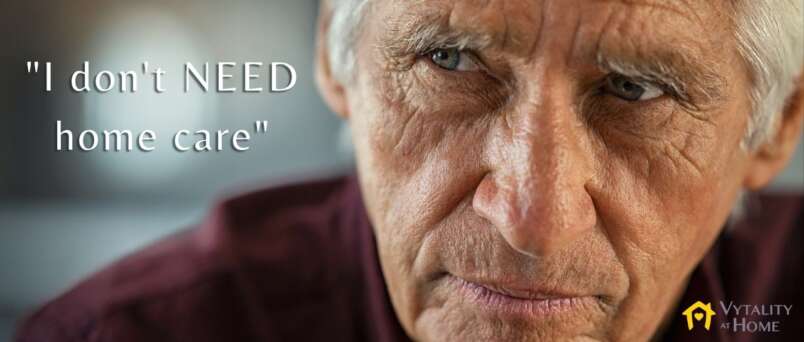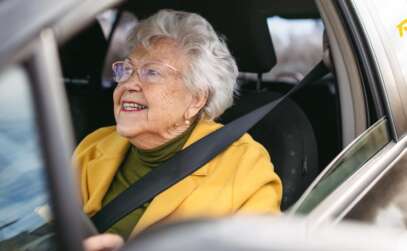Barriers to home care: how to help aging relatives see the benefits
Carrying on from our first article this month, we explore how you can help aging relatives overcome their perceived barriers to home care.
If your parents or other senior relatives could benefit from home care, one of the hardest parts of making this happen might be actually persuading them to consider home care in the first place!
As we all know, admitting that we’re getting older and can’t quite do what we used to do 10 or even 5 years ago can be hard. Much of the resistance to seniors accepting home care comes from a worry about being seen as less capable. Even if they are struggling, ageing parents and grandparents may not want to ask for extra help. You may hear phrases such as “I don’t need home care“, or “We are okay, we are fine, our neighbour helps”.
In addition, there may be many reasons underlying their reluctance to talk about home care, such as:
- Costs of home care
- Strangers in their home
- Loss of independence
- Lack of control
- Embarrassment
- Concerns about privacy and security
- Why can’t the family look after me?
Home care concerns
Your aging relatives may fear that if hey have home care, they are losing control over their everyday lives. In fact, it’s quite the reverse. Home care can actually give back independence, enabling relatives to stay in their own home for longer while accessing the bespoke level of help and support they need. One often-overlooked element of retaining control is keeping life much the same, with a few modifications, and that’s precisely what home care offers. No need to move from a home they love, to uproot from the community, or to stop doing the things they love.
That’s why at Vytality at Home we offer a range of complementary services over and above personal care, from cooking and domestic chores to transportation, and services from our trusted Partners such as snow clearance and gardening.
Privacy and security
As we discussed in our last blog, seniors may be quite concerned about “having strangers in my home”, and the potential loss of privacy and security concerns around this.
Our years of experience in health and home care enabled us to resolve this issue for many of our customers in three key ways:
- Our customers can choose their own caregiver, so it is always a familiar face who visits their home. We can also match caregivers who speak your loved one’s language if English is not their mother tongue.
- Our home care app actually tracks each caregiver and sends a notification to the customer that they are on their way. Our customers and family are connected to us via the app, and your loved one can even video call during visits to keep everyone in the loop.
- Our team is always available through the app or on the phone if customers have any questions, or want to change aspects of their care such as visit timings.
Help from friends, family and volunteers and compassion fatigue
Many seniors may rely heavily on family, friends, neighbours and other community volunteers almost without realising it. However, there comes a point where professional help is not only more effective, but better for your parents or grandparents too. Regular home care visits take the pressure off for the day to day tasks, and avoids “compassion fatigue” for those who are most often called upon to help but may not even be related. As a family member, caring for aging relatives in their own home may just not be possible. Your lives and theirs probably won’t be in sync in terms of work and your own family commitments, even if you live relatively close by. Via the Vytality app, you can monitor their care, and also book home maintenance and similar services at preferential rates. This holistic approach to home care ensures that those social visits are more enjoyable.
Costs of home care
Private home care does cost money, but there are home care grants and schemes available to help, and it is often much more affordable than full time residential care . Since many seniors own their home outright, there are no mortgage costs to pay. They can add bespoke modifications to help with mobility as required, and feel comfortable in their familiar surroundings.
By helping seniors stay in their own home for longer, home care also helps save Calgary’s health system in some rather unexpected ways. For example, seniors who have been hospitalized and return home without regular care are much more likely to be readmitted within 30 days with complications. By helping seniors recuperate in their own home after illness or surgery with short-term home care for a couple of weeks, followed by less frequent levels of help as they recover, readmissions can be reduced which is better for their health and the health system too.
Aging in Place Challenge
The National Research Council of Canada has launched the Aging in Place Challenge program which aims to address the very pressing issue of the rising costs of nationally-funded home care. According to the scheme:
“Older adults represent 17% of Canada’s population but account for 47% of total health care costs. Given the growth in our older adult population, Canada’s current long‑term care costs are expected to triple from $22 billion in 2020 to $71 billion by 2050.”
The Aging in Place Challenge program aims to reduce by 20% the number of older adults requiring nursing home care across Canada by 2031. By partnering with both the private and public sectors, plus academics and researchers, the program plans to develop new technologies to “Support older adults and their caregivers to live safe, healthy, and socially connected lives while remaining in their homes and communities of choice.”
Home care in Calgary now
Ideally, you want to plan for home care and take you time to find the right provider for you. We also know that sometimes you need expert home care now, and need to move fast.
In both cases, we can help. Contact us here at Vytality at Home and discuss your requirements, concerns or questions.
- Call us at 403 476 3680
- Email us info@vytality.ca
- Download our app: IOS or Android




